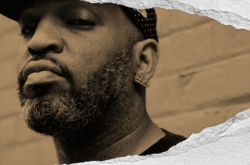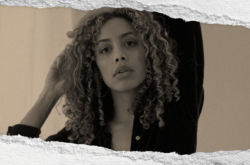Photography: Justin James
Sampling is a conversation between artists.
We’ve brought that conversation to life with “Fantastic Loops,” the companion pack series to “The Fantastic Sounds of Jay Dee aka J Dilla.” We invited some of today’s greats to take sounds from the pack and make them their own. Producing beats equally soulful, introspective, and groovy, Cam O’bi (Vic Mensa, Chance the Rapper) speaks to us about his idol Jay Dee and what he learned from him. Check out his companion pack here.
Tell us about hearing the Jay Dee pack for the first time. What kinds of sounds did it inspire? Walk us through the process of creating this companion pack. What direction you went in, what formulating ideas for it was like – give us an insight on crafting this work.
It was really cool hearing these drums because I recognized a lot of them from various songs that Dilla produced. It just felt great to have those sounds in my drum library. I pretty much just improvised with them. I would cycle through them and the sounds have so much character to them that just hearing one or two would spark an idea for a specific kind of groove in my mind. Once I had the idea in my head, I’d go and mess around until I ended up with something close to it and then I’d spend quite a bit of time changing it around, editing the drum sounds, and just having fun with it.
Walk us through your personal history with Jay Dee’s music. What was the first record of his that you remember hearing? In what ways did his work influence yours?
Man, it’s hard to remember the first record of his that I ever heard. But I know that I was hearing his records before I even knew who he was. An example of that is “Let’s Grow” by Royce da 5′ 9″. It was on the Lyricist Lounge soundtrack which is where I first heard it I think. I discovered a lot of music from that show as a kid, but I didn’t know that Dilla produced that song. That beat took me to another place. And of course “The Light” by Common was playing on the radio before I knew he had produced it too.
One that I remember hearing and knowing that he did it is “Turn Me Up Some” by Busta Rhymes. My older sister bought that album when it dropped and I remember listening to it and that song in particular just put me in a whole other zone. I saw his name in the credits and never forgot it from that point. I remember Pharrell did an interview in 2004 on 106 & Park where he was asked who his favorite producer was and he said Jay Dee, and that really meant a lot to me at the time because The Neptunes were my favorite producers. That really let me know his influence.
I wanna share a quick but very special story about his influence on me: I remember when I used to obsess over Dilla’s swing as a kid. I tried for years to figure out how to get my drums to swing like his. With the help of computer software, I finally figured out a way to quantify and extract the grooves of his songs and convert it to MIDI data. I was looking for “the formula” and I felt that I’d finally found it after years of studying. I successfully extracted the grooves from a few songs and got my kicks, snares, hi hats, all dialed in as exact as I could with the velocities and everything.
To my dismay, I realized that even though I had the right data, my grooves actually sounded nothing like his in the least bit, hahaha. But in that moment, after the disappointment I had a quick epiphany. First of all, it hit me that there is no formula. In fact, I noticed that the MIDI data for each song was different. Secondly, it hit me that I can’t actually get his swing, because that’s him and I’m not him. I realized that what Dilla was doing was a sort of musical alchemy. It dawned on me that the groove that I was after was in his bones before he ever sat down at the MPC or SP. He heard it in his head, felt it in his bones and as he’s making the track, he’s using his knowledge of his gear to make the gear do what he hears and feels in his imagination. After I realized that, my new desire became to learn musical alchemy too, instead of just simply nailing his swing. That’s when I was finally able to make my drums swing in a way that satisfied me. I accidentally discovered a part of myself, in the midst of imitation. Trying to sound like a clone made me realize that it was impossible and also not worth it.
Where do you think Jay Dee’s influence fits within the current landscape of music? In what ways have you seen his legacy live on through new artists today?
I think Jay Dee’s aesthetic influence is felt everywhere in music today, although I feel the aesthetic is just one small facet of his influence. People in our society tend to fixate on the surface things, the worldly material things, and I feel that is true with how we remember Jay Dee as well. The fixation on his aesthetic kind of shows that. On one hand, I feel that putting his MPC in a museum is a beautiful gesture, considering the history of not only hip hop but of black Americans in music. It represents a recognition of his sound and its impact on black American music as whole. But on the other hand, since his gear represents his sound, focusing on it alone steals attention away from the other aspects of his wisdom, which I believe have little to do with beats, hip hop, or even music, though I think it sheds light on the meaning behind those things. I don’t believe the MPC was even designed to do what Jay Dee did with it. If it was, more people would have done it, right?
To me, what’s more important than his aesthetic is what was going on in and around him which gave rise to that aesthetic. That is, psychologically, spiritually, and physically. One special thing about him is that he seemed to be really tapped into himself and in tune and comfortable with his own sound. He was unafraid to do things his way and that sort of energy or attitude is what I think resulted in his musical innovations. What we call that ‘Dilla sound’ is really just Dilla being himself in his music. His sound is the result of self discovery. That aspect of his influence is found far less often in today’s musical landscape. I’d even say that it’s almost non-existent in today’s climate of market-chasing, which is essentially attention-chasing. It seems instead that artists seek outside themselves for that “special something,” rather than digging internally as Jay Dee did. And that leads to the kind of imitation that doesn’t segue into innovation. It’s like a dead end – no outlet or growth from there.
Seeking internally is the most important thing I learned from studying Jay Dee’s work. In that way, the most important lesson I learned from him actually doesn’t have anything to do with him necessarily. It’s interesting how the samplers all came with this quantize feature, which subliminally attempts to restrict and ‘correct’ the user’s expression by literally ‘locking’ us in time. It’s like the musical police or the rhythmic government haha. It’s the Sir Nose D’Voidoffunk character that George Clinton warned us about. Jay Dee was like a musical Nat Turner, liberating himself and many of us, from those temporal shackles. Perhaps that’s why we’re all so inspired by him, whether you make music or not. I think it’s because his sound represented liberation, a desire to break free of some restriction imposed upon him and that’s something that everyone can relate to.
November 8, 2018



